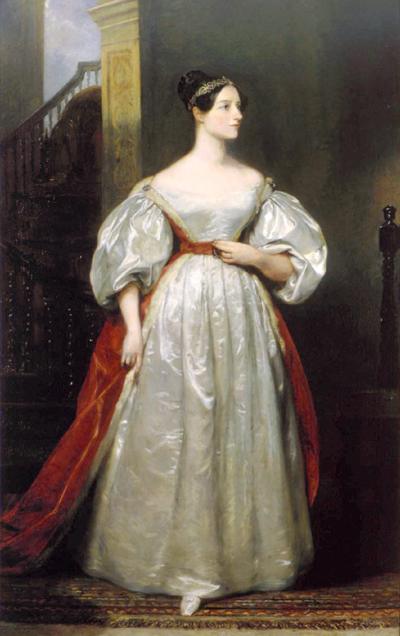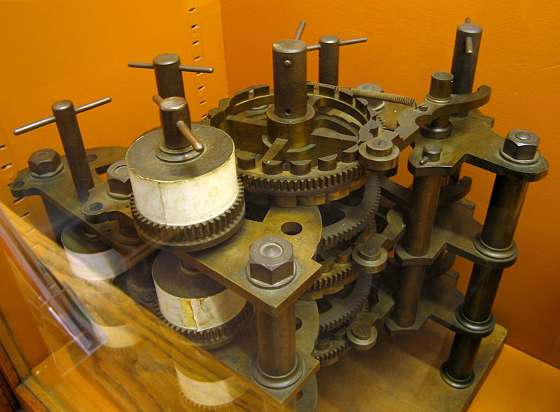| Ada Lovelace, The First Programmer |
| Written by Historian | |||
Page 1 of 2 Ada, Countess of Lovelace was born 200 years ago but her name lives on. In the 1970s the Ada language was named in recognition of her status as the first computer programmer and in 2009 Ada Lovelace Day was inaugurated to celebrate the achievements of women in science, technology, engineering and maths. Here we tell the story of how she worked with Charles Babbage on his Analytical Engine. There is an essential unfairness in the reporting of the history of computing. The software people are nearly always passed over in preference for the hardware people. We tend to remember the pioneers who built the first, second and third computers and made breakthroughs in electronics but what were the first programs ever written? And who wrote them? It is always dangerous to claim that anyone was the first anything but it is generally accepted that the very first programmer was Ada, Countess of Lovelace.
Augusta Ada King, Countess of Lovelace In the early years of computing there wasn't a clear distinction between the hardware and the software. The verb "to program" was very similar to the verb "to solder" This makes it very difficult to untangle the hardware from the software in the works of the early pioneers. In the case of Ada the fact that she was involved in the invention of programming is mixed up with the design of the very first computer hardware. Charles Babbage is generally credited with the design, if not the building, of the first computer and Ada might be described as the software side of the project. Babbage's genius and the trials and tribulation of the hardware have tended to overshadow Ada's story. Daughter of Lord ByronAugusta Ada was the only (legitimate) daughter of the poet, Lord Byron. Her mother fled the marital home, taking Ada with her just five weeks after the birth and in the following month Byron left England for good to escape his creditors. As a consequence Ada never knew her father and his only real influence on her life was the scandal of his conduct. Enough about Byron, there are plenty of books and articles about his life. Ada was educated by private tutors and for some reason she formed a strong attachment to the sciences and mathematics in particular. At the time the distinction between the arts and sciences wasn't quite so strong. It was perfectly reasonable to be the child of a poet and a mathematician. Ada's mother was something of a mathematician herself and Byron, who was always eager for news of his estranged daughter, referred to her as his "princess of the parallelograms". The bias against women doing anything important was, however, very strong and you can detect a certain novelty value in the way the male scientists that she befriended regarded and promoted her work. You also need to keep in mind that Ada was rich and privileged and her confidence in her abilities borders on the conceited. I don't think I would have liked Ada but you never can tell, she had some of the characteristics that befit a programmer! Involvement with BabbageAda is recognized as being the first computer programmer due to her involvement in Charles Babbage's project to build his Analytical Engines. Their first meeting took place on June 5th 1833 and on June 17th she attended a soiree at Babbage's home where he demonstrated a portion of his Difference Engine No 1 in London. Whatever affections there may have been between Ada and Babbage, it is worth stating that she was only 17 when they first met and he was a year older than Ada's mother. While on the subject of Ada's mother, she was present with her daughter at a demonstration of the partly finished difference engine - and understood what she saw. Her account of its workings clearly indicate that she was capable of understanding the mathematical content of the presentation as well: "It raised several Nos. to the 2nd and 3rd powers, and extracted the root of a quadratic equation.." but she didn't seem to understand its operating principles "..I had but faint glimpses of the principles by which it worked..". Lady Byron must rank as being on of the first people to write a description of an enumeration loop noting: "For instance, the Machine would go on counting regularly, 1,2,3,4 etc - to 10,000.."
Difference Engine built from original parts by Babbage's son
Lady Byron seems to have enjoyed the demonstration of the difference engine, which was a polished collection of brass cogs and indicators built to a precision that was still rare at the time. However, its effect on Ada lasted all her life. Ada not only understood the difference engine but also grasped its potential. The mathematician De Morgan was also present at the demonstration and he wrote: "While other visitors gazed at the workings of the beautiful instrument with the sort of expression, and I dare say the sort of feeling, that some savages are said to have shown on first seeing a looking-glass or hearing a gun - if indeed, they had a strong an idea of its marvelousness - Miss Byron, young as she was, understood its working, and saw the great beauty of the invention." How different things are today when the pursuit of culture means anything but grubby science and technology! The surprising thing about Ada was her determination to learn mathematics to the point where she could make some contribution to the subject. She asked Babbage for help in finding an advanced tutor and it was De Morgan, Professor of Mathematics at London University, who took on the role. You might remember De Morgan's laws if you have ever had to study Boolean logic so presumably Ada had to suffer the same course that trainee programmers have had to put up with ever since! Ada seems to have achieved a fair level of competence with mathematics, probably best described as a gifted amateur but she certainly had talent. She understood advanced algebra, geometry and, most importantly for the study of the difference engine, the theory of finite differences. At this stage it is clear that she intended to study areas of mathematics relevant to the computing engines that Babbage was working on. <ASIN:0912647094> <ASIN: 0071388605> <ASIN: 1904095763> |
|||
| Last Updated ( Sunday, 12 October 2025 ) |


